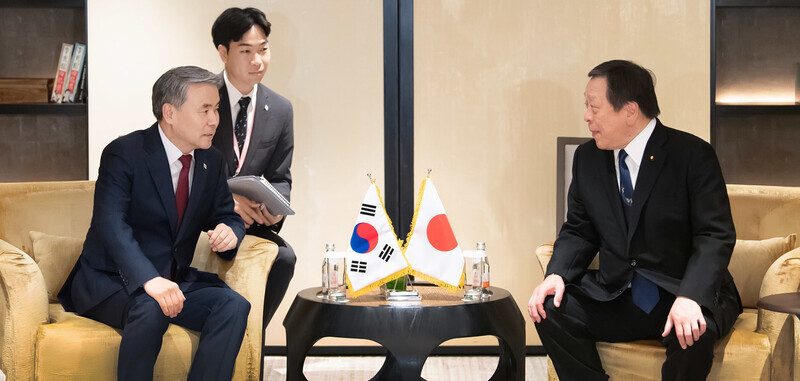hankyoreh
Links to other country sites 다른 나라 사이트 링크
Korea, Japan agree to move on from 2018 maritime dispute

South Korea and Japan have agreed to put differences aside on the 2018 radar lock-on dispute and come up with measures to prevent another similar clash going forward. Citing the threat of North Korean nuclear weapons and missiles, the Yoon Suk-yeol administration settled the conflict with Tokyo in an extension of its foreign policy keynote towards Japan, which has stressed future relations while soft-pedaling past historical issues.
Following a meeting with his Japanese counterpart on Sunday on the sidelines of the Shangri-La Dialogue held in Singapore, Defense Minister Lee Jong-sup of South Korea met with reporters and said regarding the dispute, “[Both sides] agreed to solve [the issue] by starting with working-level discussions focusing on coming up with measures to prevent a recurrence.”
The Ministry of National Defense put out a press release on the same day as well following the defense ministers’ meeting, stating, “The national defense authorities of South Korea and Japan decided to accelerate discussions regarding pending issues, including devising measures to prevent a recurrence.”
“The stances of the national defense authorities of South Korea and Japan regarding the patrol plane dispute remain unchanged,” a ministry official explained. “An agreement was reached to leave each side’s position alone for now and come up with preventative measures against a recurrence.”
On Dec. 20, 2018, ROKS Gwanggaeto the Great, a destroyer belonging to the South Korean Navy, was rescuing a North Korean fishing vessel shipwrecked in the East Sea when it was approached by a Kawasaki P-1 patrol plane of the Japanese Maritime Self-Defense Force. A patrol plane is a type of aircraft that attacks enemy warships and submarines. South Korea argued that the Japanese patrol plane displayed a threatening low-altitude flight pattern, while Japan claimed it exhibited normal flight.
In addition, Japan asserted that ROKS Gwanggaeto the Great directed its fire-control radar at the Japanese patrol plane. South Korea denied the claim, saying that Japan had made a one-sided announcement without confirming the facts even though South Korea had verified multiple times that ROKS Gwanggaeto the Great had not aimed its fire-control radar.
From a military standpoint, the Japanese patrol plane’s threatening low-altitude flight was a clearly hostile act that revealed the aircraft’s intention to attack the South Korean destroyer. At the time, regarding the dispute, the Moon Jae-in administration took the position that Japan should stop distorting facts and apologize for flying in a hostile manner toward a South Korean vessel.
While the Yoon administration has reversed course on its predecessor’s foreign security policy, regarding the maritime dispute, it reiterated multiple times that it maintained South Korea’s existing position, as conceding the matter would be akin to overlooking hostile actions by Japan.
South Korea and Japan’s decision to resolve the dispute was in part influenced by the difficulty of establishing the facts. In order to determine truth from falsehood, South Korea would have to disclose information regarding its destroyer combat system while Japan would have to reveal the radar information its patrol plane detected, but both countries are unwilling to go public with sensitive military intelligence.
Explaining the outcome of South Korea and Japan’s defense ministers’ meeting, the Ministry of National Defense explained, “As the leaders of both South Korea and Japan have confirmed the normalization of South Korea-Japan relations and agreed to elevate the two countries’ relations to a higher level, the defense authorities of both countries also agreed to communicate closely to enhance their security cooperation.”
It continued, “Security cooperation between South Korea and Japan and amongst South Korea, the US and Japan should be advanced in order to curb and respond to the threat of North Korean nuclear weapons and missiles, and establishing trust between defense authorities of South Korea and Japan and enhancing exchange and cooperation on various levels is important.”
By Kwon Hyuk-chul, staff reporter
Please direct questions or comments to [english@hani.co.kr]

Editorial・opinion
![[Column] Tariffs on China: Trump was dumb, Biden dumber [Column] Tariffs on China: Trump was dumb, Biden dumber](https://flexible.img.hani.co.kr/flexible/normal/500/300/imgdb/original/2024/0520/191716191153918.jpg) [Column] Tariffs on China: Trump was dumb, Biden dumber
[Column] Tariffs on China: Trump was dumb, Biden dumber![[Column] What if Seoul took reunification by force off the table? [Column] What if Seoul took reunification by force off the table?](https://flexible.img.hani.co.kr/flexible/normal/500/300/imgdb/original/2024/0520/3017161928630494.jpg) [Column] What if Seoul took reunification by force off the table?
[Column] What if Seoul took reunification by force off the table?- [Editorial] Intensifying US-China rivalry means Seoul must address uncertainty with Beijing sooner than later
- [Column] When ‘fairness’ means hate and violence
- [Editorial] Yoon must stop abusing authority to shield himself from investigation
- [Column] US troop withdrawal from Korea could be the Acheson Line all over
- [Column] How to win back readers who’ve turned to YouTube for news
- [Column] Welcome to the president’s pity party
- [Editorial] Korea must respond firmly to Japan’s attempt to usurp Line
- [Editorial] Transfers of prosecutors investigating Korea’s first lady send chilling message
Most viewed articles
- 1Xi, Putin ‘oppose acts of military intimidation’ against N. Korea by US in joint statement
- 2For new generation of Chinese artists, discontent is disobedience
- 3[Editorial] Transfers of prosecutors investigating Korea’s first lady send chilling message
- 4[Column] When ‘fairness’ means hate and violence
- 5[Editorial] Intensifying US-China rivalry means Seoul must address uncertainty with Beijing sooner t
- 6How K-pop broke the internet — and broke into the US market
- 7[Exclusive] Unearthed memo suggests Gwangju Uprising missing may have been cremated
- 8‘Shot, stabbed, piled on a truck’: Mystery of missing dead at Gwangju Prison
- 9Naver to acquire Canada’s Wattpad to fuel its IP ambitions
- 10AI, robots won’t free us from work - they’ll make our jobs worse